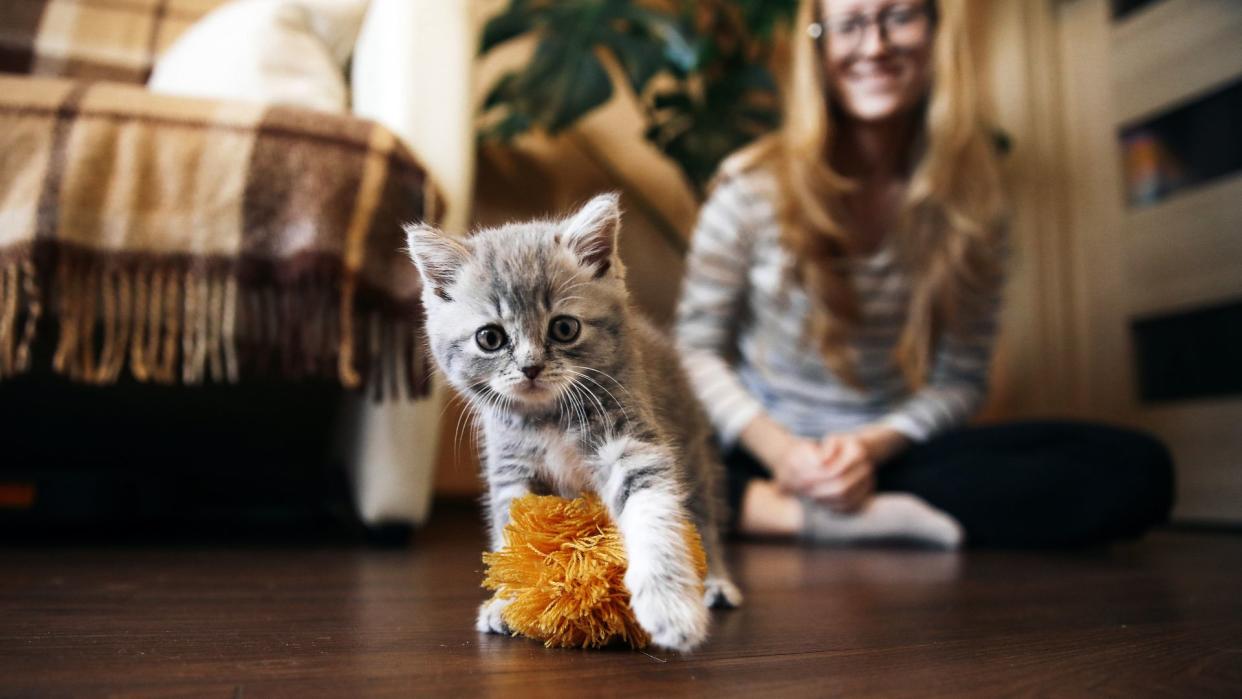5 essential kitten training tips a vet told us are well worth trying

The best kitten training tips make taking care of your fur friend easy. Contrary to popular belief, cats aren't untrainable. In fact, giving your kitten proper training from the get-go is just as important as finding the best kitten food for their dietary requirements or the best kitten toys to give their mind and body a vigorous workout.
Maybe you want to stop your kitty from pouncing on (or accidentally scratching) your feet. Perhaps you're keen to get your new fur baby acclimatized to being in a pet carrier, so travelling is easy and stress-free? Or, you may want to encourage good behavior in your home (and who can blame you?). Whatever your reasons are for wanting to train your kitten, there are several, simple but important, tricks that can help you avoid obnoxious behaviors or troublesome actions.
To help you understand what kitten training tips are worth implementing, we asked veterinarian Dr Catherine Barnette DVM for her tips — so keep scrolling. Or, if you're wondering how best to nourish and look after your kitten, you might also be interested in our guide to the best wet cat food, the best dry cat foods, and the best microchip cat flaps to help you keep out unwanted guests.
A vet's guide to the best essential kitten training tips
1. Always use positive reinforcement
Dogs are bred to please humans. In many cases, a simple pat on the head is just as rewarding to a dog as a food treat.
Cats, on the other hand, are wired differently. They don’t necessarily care about pleasing humans, and this has an important impact on training.
To train your cat, you need to identify a reward that is truly motivating for your kitten. Food is usually your best bet; the way to a cat’s heart is through their stomach. Try commercial cat treats like those listed in our guide to the best cat treats, diced chicken, tuna, and even meat-flavored baby food, to identify your cat’s favorite treat. (If you choose baby food, read the label to ensure that the food doesn’t contain garlic or onions! Garlic and onions are toxic to cats, so it’s important to check all of the ingredients carefully.)
Once you find a treat your cat loves, training will be much easier.
Also, avoid the temptation to use punishment-based training techniques. A study in the Journal of Veterinary Behavior has shown that rewards-based training is the most effective option.
2. Teach your kitten to tolerate gentle handling
Caring for a cat requires a lot of handling. First, there’s routine grooming. Throughout your cat’s life, you will need to brush your cat, trim claws, and remove matted hair or debris that may be caught in your cat’s coat. Acclimatizing your kitten to this type of handling from the start will make these tasks easier in the future, as your kitten continues to grow.
Also, take the time to hold your kitten and look at his or her coat, eyes and ears. Open your kitten’s mouth and take a look inside. Doing this a few times a week will ensure that your kitten will allow you and/or your veterinarian to do a hands-on exam when necessary.

3.Teach your kitten appropriate play
Kittens love to chase and pounce on anything that moves. Unfortunately, this can include your hands and feet! While this might be cute (or at least tolerable) when your kitten is young, it can be a serious problem when your kitten reaches adulthood.
Use the best kitten toys to play with your kitten. Toy mice or a teaser wand (a feather on a string at the end of a pole) can help your kitten burn excess energy while preserving your delicate skin. Reward your kitten for playing with these toys and others. Make a point to discourage rough or violent play, by redirecting your kitten towards more appropriate activities.
4. Socialize your kitten from early on
Animals are most receptive to new people, places, and things when they are young. According to the American Veterinary Medical Association, the critical socialization period for kittens, or the age during which they are most receptive to new situations, is from three to nine weeks of age. If you obtain your kitten before they reach nine weeks of age, you have an incredibly valuable opportunity to socialize your kitten. Even after nine weeks, however, your kitten is still more open to new experiences than they will be as an adult, so start socializing your kitten right away.
Ensure that your kitten’s exposure to new people and places is positive. When you have guests, encourage them to interact with your kitten. Use tasty treats to make those interactions positive. When you take your kitten for a veterinary visit, seek out a veterinarian who will make that visit as low-stress as possible, and use food rewards to make the experience a pleasant one. These measures will ensure that your kitten remains friendly and open to new situations in adulthood, instead of being a shy kitten that runs and hides every time someone sets foot in your home.
5. Acclimatize your kitten to a pet carrier
There will probably be times when your kitten must travel in a pet carrier. Whether you’re driving across town for a veterinary appointment or embarking on a cross-country road trip, confining your cat decreases your cat’s risk of injury and escape.
Many cats dislike carriers because they are afraid of them. They may cry and meow during travel, becoming increasingly stressed. Acclimatizing your kitten to their carrier from an early age can decrease the stress associated with travel, resulting in a more positive experience for you and your cat.
Place your kitten’s carrier in the main area of your home, and leave the door open. Toss a few treats or toys in the carrier, to encourage your kitten to enter the carrier and explore. Consider feeding your kitten a few meals in the carrier, to further increase positive association. Doing this gradually can help make the carrier a less frightening prospect for your kitten.
The bottom line? Invest for the long term
Kittens are so sweet and adorable that it’s easy to focus only on the present, neglecting to think about kitten training. But do make a conscious effort to think about the long term. You will have this kitten for the rest of his or her lifespan, so you want to take steps during the early days to make the rest of that lifespan as enjoyable as possible!
Looking for more great training tips? You’ll find them in our guide to the most common kitten behavior problems and how to fix them.
